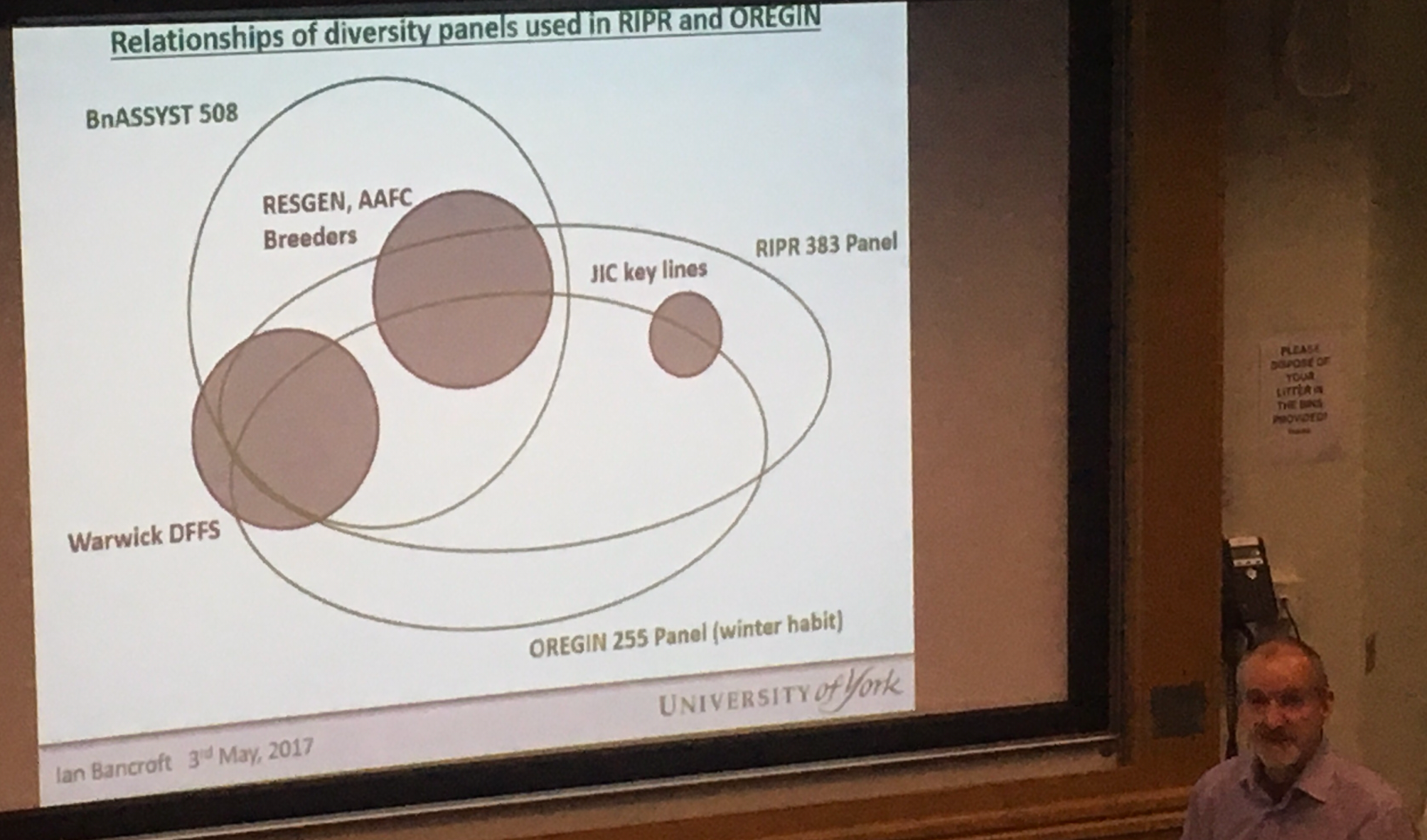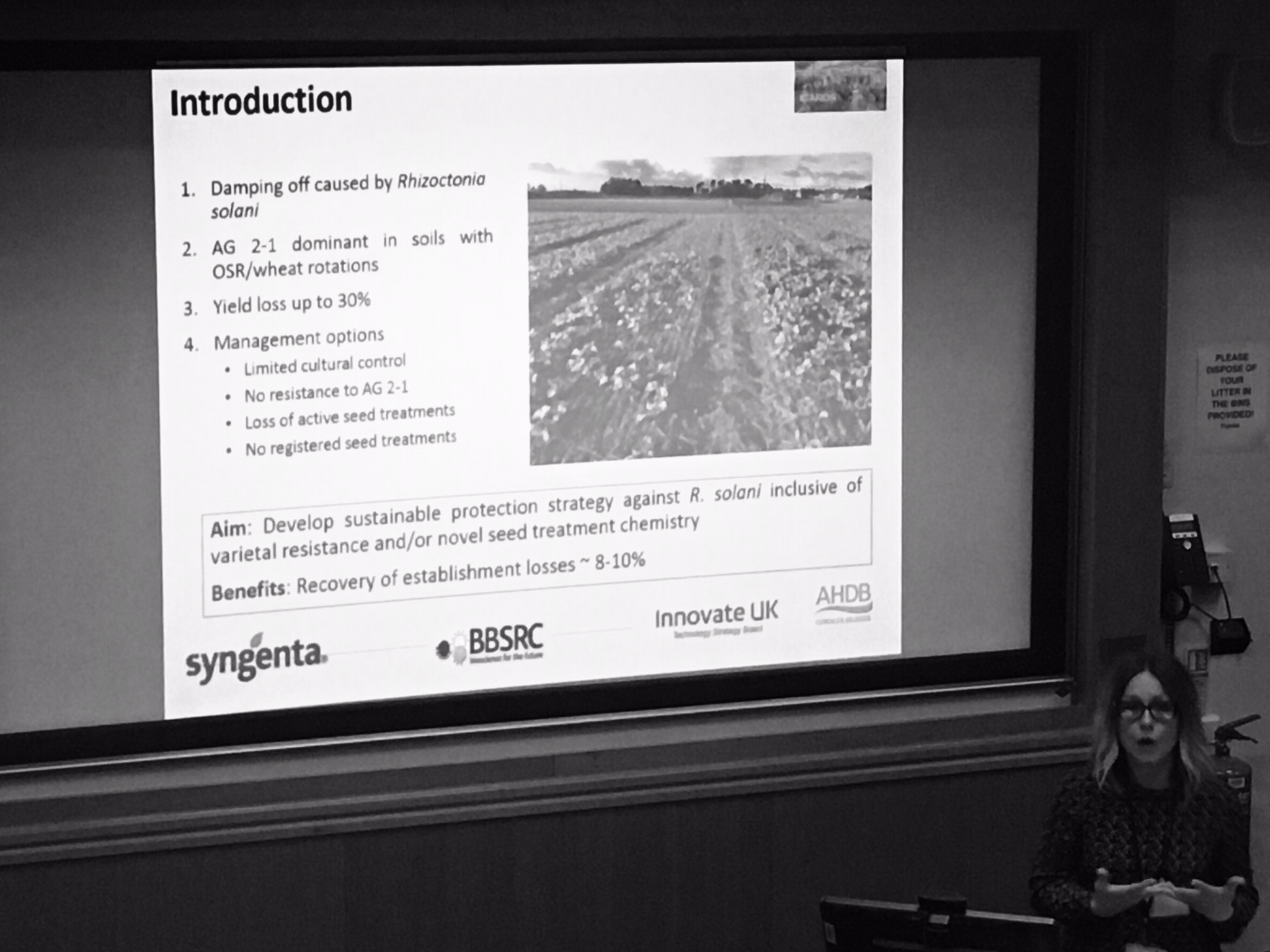It was again a great pleasure to attend the Annual Meeting of the UK Brassica Research Community (UKBRC). After the 2016 event in Norwich, this year it moved to the Department of Plant Sciences at the University of Nottingham, hosted by Dr Neil Graham. The meeting was split into two sections, the first of which allowed for short talks updating on (mostly) PhD student and postdoc projects and the latter providing updates on the resources that are being developed for use by the Brassica research community.
As in 2016 many talks focussed on research that has used the RIPR Oil Seed Rape (OSR) Diversity Set lines that have been developed in Ian Bancroft’s lab following support from the BBSRC. During the meeting Ian provided clarification as to the relationship between sets of commonly used OSR lines, which was particularly useful for those of us attending from outside of the field!
Over the course of a few years it is excellent to see the process of research projects from the early planning stages into the generation of publishable data. Thomas Alcock (University of Nottingham) has used the RIPR lines to search for QTLs that are important in metal tolerance and has found some interesting genes. Similarly Marie Bruser used these lines to look at seed pod development and discovered that genes involves in programmed cell death participate in this process. Both Thomas and Marie took an experimental approach shared by a number of other speakers, including Richard Broughton (Rothamsted Research) who works on seed phytosterol content, namely that they have discovered interesting Brassica QTLs and then moved their research back into Arabidopsis in order to test the function of orthologs. This strategy again highlights the importance of Arabidopsis for underpinning many aspects of UK crop science.
Rumiana Ray (University of Nottingham) and Graham Teakle (University of Warwick) provided updates on the ICAROS and ‘Roots of Decline’ projects respectively. ICAROS looks to develop a sustainable protection strategy for OSR against the effects of Rhizoctonia solani. Little is known about the overall impact of this pathogenic fungus so part of the project will quantify the UK yield loss and the epidemiology of the disease together with potential future management plans.
The Roots of Decline project is part of a set of grants funded under the SARISA (Soil and rhizosphere interactions for sustainable agri-ecosystems) scheme. The overall aim of this research project is to determine the effect of the soil microbiome on the growth of OSR. One part of the experimentation involves growth of plants across three UK sites (Wellesbourne, Rothamsted, Harper Adams) in different rotations with wheat. This will hopefully provide important information on how a differing soil microbiome coincides with changing yields of OSR.
After a pleasant lunch kindly funded by the OREGIN grant, Wiktor Jurowski (Earlham Institute) provided an update about the Brassica Information Portal (BIP) and how they are integrating their tools with CyVerse and ElixirUK. They have recently published a pre-print describing the tools available in the BIP and are also planning to hold a Workshop on these tools at the Earlham Institute on June 15th. Please contact Wiktor for details about this meeting.
Lars Ostergaard introduced the very exciting BRAVO project, which is a recently funded BBSRC sLOLA. BRAVO will fund research across seven UK academic sites and importantly provides opportunities for collaboration with members of the agricultural industry. Across five work packages the project aims to understand the gene networks that control flowering time and study how these networks affect all developmental stages, from vegetative growth to seed production. The £4.4million of funding will truly move this area of research forward over the next five years….. look out for its outputs soon.
The final presentation was provided by Mathew Nelson who is the Research Leader for Crop Plants at Kew Gardens. He hopes to lead a consortium that will investigate the production of novel bioactive compounds that are produced in Brassicas. This is somewhat inspired by the development of Beneforte broccoli, which has elevated levels of glucoraphanin, a phytonutrient that boosts the levels of antioxidant enzymes in humans.
Earlier in the day Mikhaela Neequaye (Quadram Institute) had given a talk on a similar topic, describing her PhD work that aims to identify broccoli lines that have altered levels of glucosinolates. As part of this study she is using the BRACT facility at the John Innes Centre to generate gene-edited Brassica oleracea mutants.
Mathew Nelson is organising a meeting for potential stakeholders in his proposed project at Kew gardens in June or July so please contact him if you have interest in this exciting research area.










